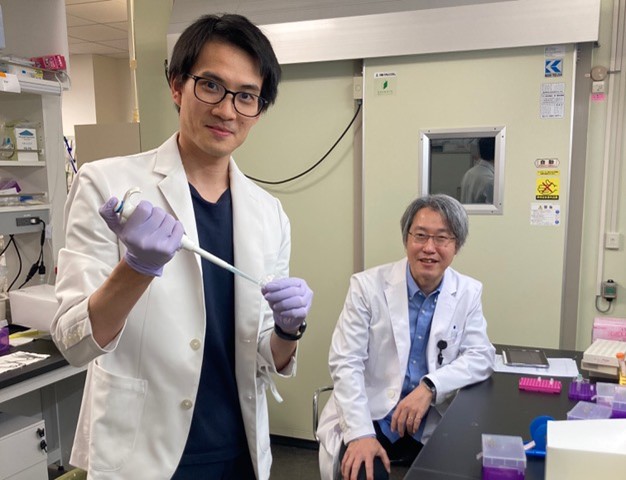Researchers identify a tumor protein p63 isoform that induces rheumatoid arthritis and is targeted by methotrexate
Methotrexate (MTX) is a first-line treatment in the fight against rheumatoid arthritis (RA)—an autoimmune disease characterized by joint deterioration. However, the precise therapeutic mechanisms of MTX are poorly understood. Now, researchers from Chiba University reveal that a variant of tumor protein p63, TAp63, is suppressed by MTX, which in turn suppresses the expression of another protein, Foxp3, and aggravates RA.

Title: Chiba University researchers in their laboratory
Caption: Researchers used murine and human CD4+ T cell lines to study the influence of methotrexate on TAp63 expression
Credit: Akira Suto from Chiba University
License Type: Original Content
Usage Restriction: w. credit
Rheumatoid arthritis (RA) is an autoimmune disease characterized by joint deterioration. The clinical outcomes of patients with active RA can be improved using anti-rheumatic medications, such as methotrexate (MTX). Many patients rely on MTX to limit the destructive joint damage and functional disability typical of RA. Although the drug is a folic acid antagonist, its precise mechanisms in RA patients are largely unknown.
Previous research suggests that MTX also affects a type of white blood cell called CD4+ T cells. These cells are believed to play a role in the development of RA—specifically, the balance between the activation of interleukin-17-producing helper T (Th17) cells and CD4+ regulatory T (Treg). Researchers suspect that MTX affects CD4+ T cells by suppressing T cell activity and increasing Treg cells, but its specific effects besides folate metabolism remain unclear.
Recently, a group of researchers discovered that MTX targets tumor protein p63 (TP63) in CD4+ T cells. Their findings were published online on May 22, 2023, in Volume 8 of the JCI Insight journal. The team was led by Dr. Akiro Suto, an Associate Professor at the Department of Allergy and Clinical Immunology at the Graduate School of Medicine, Chiba University, and the Institute for Advanced Academic Research at Chiba University. It also included Dr. Kensuke Suga, Dr. Shigeru Tanaka, and Dr. Hiroshi Nakajima of the Department of Allergy and Clinical Immunology at Chiba University and Dr. Osamu Ohara of the Department of Applied Genomics at the Kazusa DNA Research Institute.
“We were keen to profile gene expression before and after MTX treatment since the drug likely targets CD4+ T cells, and little is known about its influence on gene expression in patients with active RA,” explains Dr. Suto when discussing the team’s motivation to pursue the research.
The researchers employed DNA microarray profiling of human CD4+ T cells from RA patients to understand how MTX influences gene expression. They also used gene knockdown—a molecular technique to suppress a target gene—and RNA sequencing (RNA-Seq) to validate gene function. The researchers found that TAp63, a protein isoform of TP63, was highly expressed in human and mouse Th17 cells. Dr. Suto says, “Patients who received MTX treatment had significantly lower TAp63 messenger RNA expression in their CD4+ T cells. MTX also suppressed TAp63 proteins in human and mouse Th17 cells. TAp63 suppression in mouse Th17 cells resulted in the improvement of autoimmune arthritis in mice.”
The RNA-Seq and gene knockdown data revealed that another gene, FOXP3, the master regulator of Treg cells, was targeted by TAp63. When TAp63 was “knocked down” in Treg cells, Foxp3 protein expression increased. By performing a reporter assay, the researchers confirmed that TAp63 was bound to the FOXP3 enhancer and suppressed it. Together, these findings suggest that TAp63 is intricately linked to the balance of Th17 and Treg cell differentiation. Thus, inhibiting TAp63 could enhance the suppressive function of Treg cells and limit autoimmune RA.
These findings reveal a robust mechanism for MTX action and show how Treg cells can be preserved in RA. They also demonstrate the potential of TAp63 as a new therapeutic target for RA.
About Associate Professor Akira Suto
Dr. Akira Suto earned his Ph.D. from Chiba University in 2003 and is an Associate Professor in the Department of Allergy and Clinical Immunology at the Graduate School of Medicine at Chiba University. His research focuses on the mechanisms of T cell differentiation and the development of autoimmune diseases. He has published over 90 peer-reviewed papers since 2000.
Reference:
Title of original paper: TAp63, a methotrexate target in CD4+ T cells, suppresses Foxp3 expression and exacerbates autoimmune arthritis
Authors: Kensuke Suga1, Akira Suto1,2, Shigeru Tanaka1, Yutaka Sugawara1, Takahiro Kageyama1, Junichi Ishikawa1, Yoshie Sanayama1, Kei Ikeda1, Shunsuke Furuta1, Shin-Ichiro Kagami3, Arifumi Iwata1, Koichi Hirose1, Kotaro Suzuki1, Osamu Ohara4, and Hiroshi Nakajima1
-
Affiliations:
- Department of Allergy and Clinical Immunology, Graduate School of Medicine, Chiba University, Japan
- Institute for Advanced Academic Research, Chiba University, Japan
- Research Center for Allergy and Clinical Immunology, Asahi General Hospital, Japan
- Department of Applied Genomics, Kazusa DNA Research Institute, Japan
DOI: 10.1172/jci.insight.164778
Contact
Akira Suto
Graduate School of Medicine, Chiba University
Address: 1-8-1 Inohana, Chuo-ku, Chiba-shi, Chiba 260-8670, JAPAN
Email: suaki@faculty.chiba-u.jp
Public Relations Office, Chiba University
Address: 1-33 Yayoicho, Inage, Chiba 263-8522, Japan
Email: koho-press@chiba-u.jp
Tel: +81-43-290-2018
Recommend
-

Fostering Global Well-being Through Horticultural Innovation
2022.09.27
-

Safeguarding Lifelines: Rapid Restoration of Infrastructure in Earthquake-Prone Japan
2024.10.21
-

The role of the Research Institute of Disaster Medicine (RIDM): The indispensable research hub for urban digital transformation
2023.02.23


